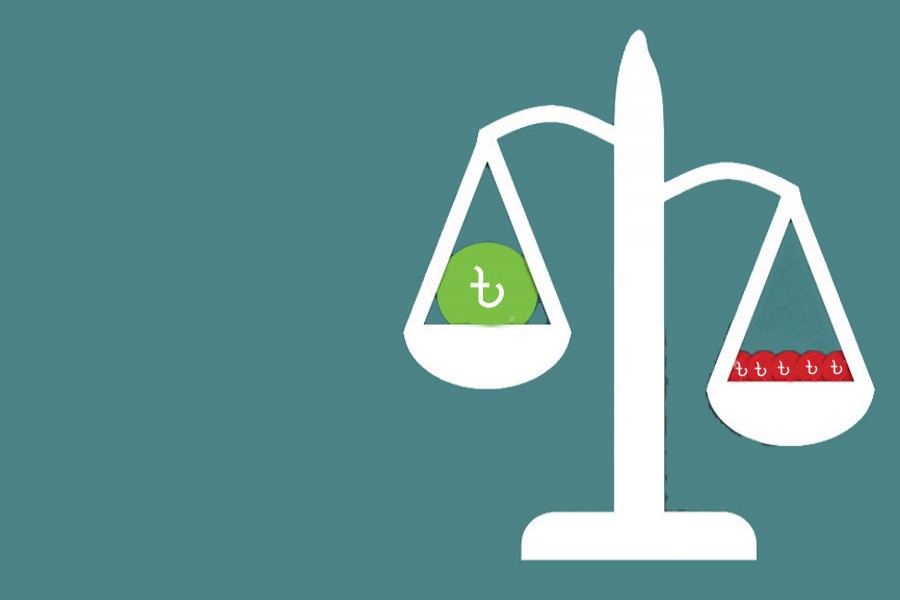The people have reasons to be enthusiastic as the Finance Minister said early this month that Bangladesh recorded the highest growth in gross domestic product (GDP) across the world in the past 10 years. More job opportunities for the youth, social protection measures for the poor and vulnerable groups and various trickle-down effects of development should have accompanied the growth as the common people expect prosperity to be reflected in their lives.
However, economists regret growing disparity in society reaching a danger level. "We have nothing to boast of 8.13 per cent growth as this means higher resource gap in the country," former president of Bangladesh Economic Association Mainul Islam said presenting a paper on widening inequality on September 7.
The last Household Income and Expenditure Survey (2016) by the Bangladesh Bureau of Statistics showed Gini coefficient - an economic method to measure inequality on a scale of 0 to 1.0 - at 0.48 for income inequality and at 0.74 for wealth inequality. It might have widened further after Bangladesh's ranking third in terms of growth of rich people at 11.04 per cent a year. The ultra-rich people with a net worth of $30 million or higher amount, are growing at the fastest rate in Bangladesh, the World Ultra Wealth Report 2018 suggested.
But the country has seen less than one million of the workforce being absorbed in jobs a year when more than two million new entrants are coming to the market. Bangladesh's position, in the Asian Development Bank's social protection index, is 21st among 25 countries of Asia and the Pacific region. The poor are yet to be covered by insurance schemes for their healthcare.
Also infrastructure deficiency, energy crisis and stagnation in investment have been identified as three major barriers to boosting industrial output, according to the Metropolitan Chamber of Commerce and Industry. In its quarterly review of the economy, the trade body has observed that despite the country's achievements in recent decades, there are downside risks.
It is hard to understand how in the World Bank's (WB's) ease of doing business index, Bangladesh still ranks 176th among 190 countries. Many of the countries above or close to Bangladesh in ranking are affected by civil war, social unrest and political strife and even dubbed failed states. It doesn't bode well for us when foreign diplomats and potential investors point out that companies willing to make investment need approval from 42 agencies.
In the context of 8.0 per cent annual growth and 188 per cent growth in 10 years, as per the Spectator Index, what a WB official said was a shocking fact of well-publicised statistics. Dandan Chen, the WB's acting country director for Bangladesh, observed recently that one-fourth of the country's population is still plagued by poverty.
The poverty situation with 24.3 per cent people still living below the threshold, contrasts Bangladesh's per capita GDP that rose to $1,888, enough for attainment of the lower middle-income country status. Countries such as Cambodia and Uzbekistan with GDP per capita of $1,599 and $1,560 respectively have lower level of poverty at 17.7 per cent and 14.1 per cent.
Poverty was a major focus of development in the pre-independence decade of the 1960s. Bangladesh was also considered a test case of development in the 1970s. In 2000, then US President Bill Clinton said during his Dhaka visit that poverty cannot be a destiny of people. And the country has successfully come out of the shadow of famine that last visited Bangladesh in 1974.
However, the concerns over poverty situation and rising inequality warrant a thorough review of national development policies and actions so that those at the bottom are not left behind.


